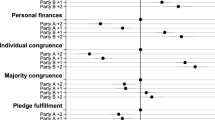Abstract
Economics has long been thought to influence vote choice. Unfortunately, the temporal pattern of economic evaluations is little studied. Using the Senate elections of 1956 through 1988, this research presents an assessment of the role of retrospective and prospective evaluations on vote choice. The findings of this research support the argument that people look to the future when making the vote decision. Consequently, this research also argues that the simple reward/punishment view of voting does not reflect the richness of economic voting. Finally, a causal model is constructed to demonstrate that these prospective evaluations exert an influence on vote choice independent of both party identification and retrospective evaluations.
Similar content being viewed by others
References
Abramowitz, A.I. (1980). A comparison of voting for U.S. Senator and Representative in 1978. American Political Science Review 74: 633–640.
Abramowitz, A.I. (1985). Economic conditions, presidential popularity, and voting behavior in midterm congressional elections. Journal of Politics 7: 31–43.
Achen, C.H. (1989). Prospective voting and the theory of party identification. Paper presented at the 1989 Annual Meeting of the American Political Science Association.
Aldrich, J.H. and Nelson, F.D. (1986). Logit and probit models for multivariate analysis with quantitative dependent variables. In W.D. Berry and M.S. Lewis-Beck (Eds.), New tools for social scientists, 115–166. Beverly Hills: Sage.
Alt, J.E. and Chrystal, K.A. (1983). Political economics. Berkeley: University of California Press.
American National Election Studies, 1956–1988.
Begg, D.K.H. (1988). The rational expectations revolution in macroeconomics: Theories and evidence. Baltimore: Johns Hopkins University Press.
Bullock, C.S., III and Seicchitano, M.J. (1985). Partisan defections and Senate incumbent elections. In G.R. Parker (Ed.), Studies of Congress, 35–43. Washington, DC: Congressional Quarterly Press.
Cagan, P. (1956). The monetary dynamics of hyperinflation. In M. Friedman (Ed.), Studies in the quantity theory of money, 25–120. Chicago: University of Chicago Press.
Campbell, A., Converse, P.E., Miller, W.E. and Stokes, D.E. (1960). The American voter. New York: Wiley.
Chappell, H.W., Jr. and Keech, W.R. (1985). A new view of political accountability for economic performance. American Political Science Review 79: 10–27.
Conover, P.J., Feldman, S. and Knight, K. (1987). The personal and political underpinnings of economic forecasts. American Journal of Political Science 31: 559–583.
Curtin, R.T. (1982). Indicators of consumer behavior: The University of Michigan survey of consumers. Public Opinion Quarterly 46: 340–352.
Downs, A. (1957). An economic theory of democracy. New York: Harper.
Farrar, D.E. and Glauber, R.R. (1967). Multicollinearity in regression analysis: The problem revisited. Review of Economics and Statistics 49: 92–107.
Feldman, S. (1982). Economic self-interest and political behavior. American Journal of Political Science 26: 446–466.
Feldman, S. (1985). Economic self-interest and the vote: Evidence and meaning. In H. Eulau and M.S. Lewis-Beck (Eds.), Economic conditions and electoral outcomes: The United States and Western Europe, 144–166. New York: Agathon Press.
Fiorina, M.P. (1978). Economic retrospective voting in American elections. American Journal of Political Science 22: 426–443.
Fiorina, M.P. (1981). Retrospective voting in American national elections. New Haven: Yale University Press.
Hibbing, J.R. and Alford, J.R. (1982). Economic conditions and the forgotten side of Congress: A foray into U.S. Senate elections. British Journal of Political Science 12: 505–516.
Key, V.O. (1966). The responsible electorate. New York: Vintage.
Kinder, D.R. and Kiewiet, D.R. (1979). Economic discontent and political behavior: The role of personal grievances and collective economic judgments in congressional voting. American Journal of Political Science 23: 495–527.
Kinder, D.R. and Kiewiet, D.R. (1981). Sociotropic politics: The American case. British Journal of Political Science 11: 129–161.
Kinder, D.R. and Mebane, W.R. (1983). Politics and economics in everyday life. In K.B. Monroe (Ed.), The political process and economic change, 141–180. New York: Agathon Press.
Kramer, G.H. (1971). Short-term fluctuations in U.S. voting behavior, 1896–1964. American Political Science Review 65: 131–143.
Kuklinski, J.H. and West, D.M. (1981). Economic expectations and voting behavior in United States Senate and House elections. American Political Science Review 75: 436–447.
Lane, R.E. (1962). Political ideology. New York: The Free Press.
Lane, R.E. (1986). What are people trying to do with their schemata? The question of purpose. In R.R. Lau and D.O. Sears (Eds.), Political cognition, 303–318. Hillsdale, NJ: Lawrence Erlbaum.
Lewis-Beck, M.S. (1980). Applied regression: An introduction. Beverly Hills: Sage.
Lewis-Beck, M.S. (1988). Economics and the American voter: Past, present, future. Political Behavior 10: 5–21.
Lewis-Beck, M.S. (1989). Economics and elections. Ann Arbor: The University of Michigan Press.
Lewis-Beck, M.S. and Skalaban, A. (1989). Citizen forecasting: Can voters see into the future? British Journal of Political Science 19: 146–153.
Linden, F. (1982). The consumer as forecaster. Public Opinion Quarterly 46: 353–360.
Lockerbie, B. (1989). Change in party identification: The role of prospective economic evaluations. American Politics Quarterly 17: 291–311.
Lockerbie, B. (1988). The voters' decision: Retrospective and prospective economic evaluations. Ph.D. Dissertation at the University of Iowa.
Mann, T.E. and Wolfinger, R.E. (1980). Candidates and parties in Congressional elections. American Political Science Review 74: 617–632.
Miller, A.H. and Wattenberg, M.P. (1985). Throwing the rascals out: Policy and performance evaluations of presidential candidates, 1952–1980. American Political Science Review 79: 359–372.
Roper, B.W. (1982). The predictive value of consumer confidence measures. Public Opinion Quarterly 46: 361–367.
Shaw, G.K. (1984). Rational expectations: An elementary exposition. New York: St. Martin's Press.
Sniderman, P.M. and Brody, R.A. (1977). Coping: The ethic of self-reliance. American Journal of Political Science 21: 501–522.
Westlye, M.C. (1983). Competitiveness of Senate seats and voting behavior in Senate elections. American Journal of Political Science 27: 253–283.
Wright, G.C., III and Berkman, M.B. (1986). Candidates and policy in United States Senate elections. American Political Science Review 80: 567–588.
Author information
Authors and Affiliations
Rights and permissions
About this article
Cite this article
Lockerbie, B. The temporal pattern of economic evaluations and vote choice in Senate elections. Public Choice 69, 279–294 (1991). https://doi.org/10.1007/BF00123865
Received:
Accepted:
Issue Date:
DOI: https://doi.org/10.1007/BF00123865




